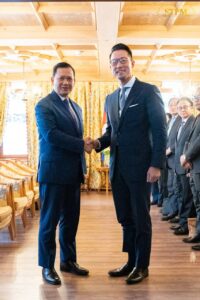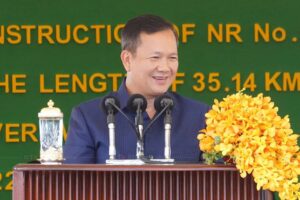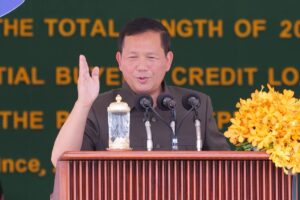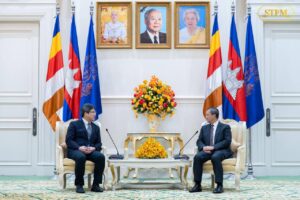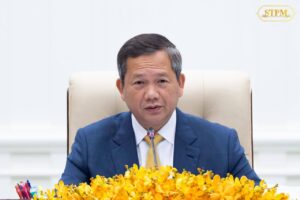(1) After Covid-19, former obstetrics and gyncology converting to a specialized cancer hospital
For many mandates, the Royal Government has worked hard to strengthen the capacity to provide medical treatment, especially the capacity of many national state hospitals, to our brothers and sisters. At this stage, both our human and financial resources are limited. This strengthening of skills is something we do from the top down […] The Royal Government, in the previous mandates and at the beginning of this mandate, is preparing to transform the Luang Mae Hospital, which was formerly a hospital specalied in obstetrics and gyncology (women diseases), into a specialized cancer hospital […] By the way, at the time that the COVID-19 broke out […] We received the instruction in principle from Samdech Techo Hun Sen, then Prime Minister, to set up (the Luang Mae Hospital as) one of the COVID-19 intensive care hospitals. After COVID-19 faded […] we see that the demand for cancer treatment has increased […]
(2) A cancer control and treatment hospital will be ready according to plan
According to the report of the Minister of Health, HE Chheang Ra, we found that there are 20,000 new cases (of cancer) per year. It may be a small number, but with our population of 17 million, Compared to other countries, we can think of this as an alarming rate. Our goal therefore is to treat those who have been living with cancer and save their lives […] (It is a good thing that our hospital has) the ability to detect diseases at an early stage or at signs of development and the ability to prevent them […] We have some (cancer) treatment in Calmette Hospital and in the Russian hospital, but we do not yet have a separate specialist hospital for this type of disease. So we decided to set up this Luang Mae hospital (for cancer treatment) […] We need to do a lot of modernization as this hospital was originally aimed for treating women […] To become a cancer control and treatment hospital, a lot of infrastructure needs to be prepared […] We are not slowing down, though. Hopefully, it will be ready according to plan. Now, we have offered a consultation service step by step […]
(3) To expand control and treatment of cancer service to regional hospitals in the future
At the beginning of this mandate, I have signed a budget of more than 10 million USD to update training for doctors, because the lack of specialist is a challenge. We may get a building ready and fully equipping it in two years, but training specialist doctors takes a long time […] We are considering both preparing human resources and going forward, setting a goal to strengthen and enhance the capacity of (doctors) […] We need to be able to treat cancer at the regional level so that people in various regions and districts, for example, in Preah Vihear, Kampong Thom, do not need to come to Phnom Penh (for such treatment). They can go to Siem Reap, which is a regional hospital. We have two regional hospitals, one in Siem Reap and one in Kampong Cham, but there is no plan yet to upgrade (the capacity to treat cancer) […] however, that is our goal in the future […] so that we will be able to expand this service to the local level […]
(4) Nutrition, expired and high in chemical food, and lack of sports – are some ofthe causes of cancer
The important thing is not abut treatment, but about prevention. We want the number of 20,000 people (who) were detected (to have been living with this disease), and we don’t know yet how many more, to drop to 2,000 or 200 or even zero, if possible. But it is difficult to get to zero because cancer can be caused by human factors. (According to) genetics, if anyone of both of their parents has/have had cancer, it would be difficult for their children (to be safe from it) […] In the report, HE Chheang Ra mentioned some reasons that (can cause cancer) – 1. Nutrition […] 2. Expired, damaged or high in chemicals food; and 3. sports-related […] The most important thing is to participate in prevention […]
(5) Four effective measures help with cancer prevention
To help prevent this disease, firstly, the relevant ministries and institutions, the Ministry of Commerce, the Ministry of Health, the Ministry of Agriculture, Forestry and Fisheries, the General Department of Customs and Excise, and relevant authorities should strictly inspect the import of vegetables, meat, and the use of various chemicals to reduce the risk of (occurrence of) cancer due to nutrition […]
Secondly, the Ministry of Health, the Department of Health, in cooperation with the Ministry of Education, Youth and Sports, help spread and educate in schools, for people to understand how to prevent or avoid eating or doing any activity that can increase the risk of developing cancer […]
Thirdly, there must be an awareness of increasing vaccinations. In some advanced countries, cervical cancer also exists, but the risk of death is reduced due to previous vaccinations. We will strive to expand our efforts on this task […]
Another point that is important for effective prevention is the people. If the state only issues policies and provide drugs […] but the people do not participate or pay attention, it is difficult to achieve good results. (We are talking about) eating, consumption, and sports, but if the people do not practice them, it would be difficult to score positive results […]
(6) Cambodia allows no production of e-cigarettes
I vsisited a country […] a private sector company, and even a minister came to the Minister of Trade – Lok Chumteav Cham Nimol – inquiring about the policy of producing e-cigarettes in Cambodia. I said there no need for that project, even if it is for export only. We have thousands of options for people to invest in. Even without investing in e-cigarettes in the country, Cambodia is not going to be poor from that. We choose what investment is worth coming […] I have already given the policy to Lok Chumteav Cham Nimol. She also informed the inquirer that “Cambodia does not allow it.” Let them go to another country. No need to worry about whether it can stay or not. You can come and invest in something else, or otherwise, you may find another place for it […]
(7) Healthy people mean less cost of health and strong productive force
I see our that these days people are practicing sports a lot. They understand the importance of health. Sports does help a lot […] Health expense is a heavy burden for governments all over the world […] If people are healthy, firstly, the cost of health is not much, and secondly, considering that people are an important resource, if they are sick, they cannot produce, and their productivity is poor. If they are not sick, their health is good, they are a productive workforce. I believe that our people invest in learning, invest in working hard, but ultimately forget to invest in themselves. Invest in products, produce works, but do not forget to invest in preventing their own health […]
(8) National health depends on people, so the people’s health must be protected
We set up public parks in every province, creating conditions for them to run. All these are possible because, firstly, we have and ensure safety; […] secondly, the environment […] and thirdly, the civilized and modern lifestyle of the people […] In the private sector, Boreys (residential area projects) now are not just about houses. Some Boreys set aside a lot of land, make green spaces, parks, sports facilities […] I see that this formula responds (to the actual situation) which is a mirror reflecting the development of society, the economy, the living conditions of the people, and the development of social modernization […] National health depends on the people, and the health of the people must be protected together, both the people and the government, at all levels, as much as possible […]./.

